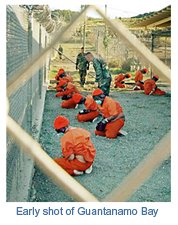Canadian Supreme Court Repudiates the Legal Black Hole Paradigm
The Supreme Court of Canada handed down a judgment relating to detainees in Guantanamo Bay on May 23, holding that the one Canadian detained there may rely upon the Canadian Charter of Rights and Freedoms to obtain some due process protection from the Canadian government.
Overview
The decision has already been reviewed briefly from the perspective of Canadian constitutional law on the University of Toronto and Osgoode Hall law school blogs, so I will not repeat that process here. But the decision has importance from the perspective of international law, and the relationship between international and constitutional law.
I would suggest that the judgment refutes the arguments, voiced most  recently by several scholars at the ASIL conference in April, that there are circumstances in the so-called “war on terror” in general, and the treatment of detainees in particular, in which neither constitutional law or international law (whether human rights or humanitarian law) ought to govern the conduct and procedures of the detaining forces.
recently by several scholars at the ASIL conference in April, that there are circumstances in the so-called “war on terror” in general, and the treatment of detainees in particular, in which neither constitutional law or international law (whether human rights or humanitarian law) ought to govern the conduct and procedures of the detaining forces.
The Supreme Court held that it is precisely when the agents of the Canadian government participate in conduct and circumstances that constitute violations of international law, that the application of the Charter will be triggered and its protections available to detainees (or at least Canadian detainees – more on that distinction below).
Background
Omar Khadr was 15 years old when he was captured by U.S. forces in Afghanistan in July, 2002. He was one of the few detainees who has been arraigned and who is actually moving towards a trial before the much-disputed Military Commissions in Guantanamo Bay. He has been charged with murder and with conspiracy to commit other acts of murder and terrorism. The murder charge arises from the death of a U.S. soldier during the skirmish in which he was captured.
